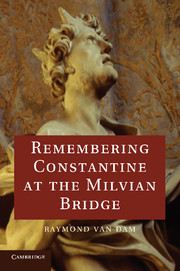Book contents
- Frontmatter
- Contents
- PREFACE
- ABBREVIATIONS
- TIMELINE
- Constantines Empire After 312
- 1 FOREWORD: VISIONS OF CONSTANTINE
- 2 THE AFTERLIFE OF CONSTANTINE
- 3 ECCLESIASTICAL HISTORIES
- 4 CONSTANTINE'S MEMORIES
- 5 EUSEBIUS' COMMENTARY
- 6 SHAPING MEMORIES IN THE WEST
- 7 ROME AFTER THE BATTLE
- 8 BACKWARD AND FORWARD
- 9 REMEMBERING MAXENTIUS
- 10 BACK WORD: THE BRIDGE
- EDITIONS AND TRANSLATIONS
- BIBLIOGRAPHY
- INDEX
9 - REMEMBERING MAXENTIUS
Published online by Cambridge University Press: 03 May 2011
- Frontmatter
- Contents
- PREFACE
- ABBREVIATIONS
- TIMELINE
- Constantines Empire After 312
- 1 FOREWORD: VISIONS OF CONSTANTINE
- 2 THE AFTERLIFE OF CONSTANTINE
- 3 ECCLESIASTICAL HISTORIES
- 4 CONSTANTINE'S MEMORIES
- 5 EUSEBIUS' COMMENTARY
- 6 SHAPING MEMORIES IN THE WEST
- 7 ROME AFTER THE BATTLE
- 8 BACKWARD AND FORWARD
- 9 REMEMBERING MAXENTIUS
- 10 BACK WORD: THE BRIDGE
- EDITIONS AND TRANSLATIONS
- BIBLIOGRAPHY
- INDEX
Summary
Years afterward constantine remembered the battle at the Milvian Bridge as the moment when he had first used a military standard constructed in the shape of a cross. Before the battle, he claimed, both he and his army had witnessed a vision of the cross in the sky, and Jesus Christ himself had appeared in a dream to explain the vision and direct him to build a battle standard. In his Life of Constantine Eusebius subsequently embedded those memories in a religious context and transformed the vision and the battle into moments of conversion to Christianity, of the emperor personally and of the empire in general. In this process of remembering and recording, however, both emperor and bishop had furthermore tried to forget someone else. During the battle outside Rome another emperor had also been present. But when Maxentius had fallen into the Tiber River, he had at the same time slipped into oblivion.
Constantine's memories and Eusebius' reinterpretation of those memories have set the tone for modern scholarship too, and overlooking Maxentius has reinforced the notion that the battle was all about Constantine and Christianity. In contrast, focusing on Maxentius offers an opportunity to avoid highlighting Christianity. The confrontation between these two emperors instead emphasized other consequential trends. One concerned the orientation of the Roman empire. Maxentius symbolized the conventional importance of Rome as the capital, while Constantine represented the increasing significance of frontier zones, in particular in the north along the Rhine and the Danube.
Information
- Type
- Chapter
- Information
- Remembering Constantine at the Milvian Bridge , pp. 224 - 252Publisher: Cambridge University PressPrint publication year: 2011
